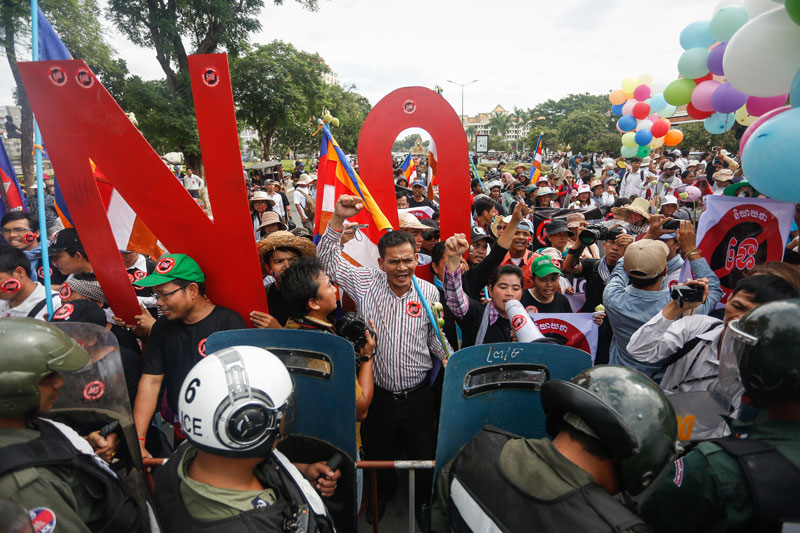The CPP’s 68 lawmakers pushed a controversial NGO law through the National Assembly on Monday morning without debate and without the opposition CNRP, whose 55 members boycotted the session in protest over legislation they say the government could use to stifle dissent.
The U.S., U.N. and European Union have joined hundreds of local and international NGOs in opposing the law, which would force all non-government groups to register with the state, make them file annual activity and financial reports, and give ministries the power to deny NGO applications and shut down organizations on vague grounds. They have branded the law unconstitutional—for impinging on the freedom of association—and fear the government will wield its new powers against its critics.

The version the lawmakers voted on did make a few concessions to its opponents. An article that would have barred anyone whose NGO application was rejected from ever applying again was removed. It also reduces the minimum number of founding members a group needs from five to three. But the rest of the most contentious articles—including one that will let the government close down organizations deemed to be jeopardizing Cambodian tradition —survived largely intact.
The CPP says the country needs the law as a defense against international money laundering and terrorist groups aiming to funnel their funds into Cambodia via NGOs, though opponents say the country already has laws to combat both.
Just before Monday’s vote, Interior Minister Sar Kheng said NGOs had nothing to fear.
“I want to make it clear that this draft law on NGOs and associations is not intended to restrict NGOs from doing their work,” he said. “After the law is approved, the government will continue to cooperate with associations and NGOs to implement it and make sure it does not affect the freedom of expression.”
CPP lawmaker Lork Kheng, however, said she hoped to see the law deployed against groups that spread false information.
“I completely support this law because we can see, and I have seen video footage of this, that there are NGOs that have caused serious problems for the country. Like in 2013, there were some NGOs that made false allegations about indelible ink for voting,” she said.
Conflicting reports emerged on the day of the 2013 poll about whether the ink being used to mark the fingers of voters could be washed off, allowing them to cast multiple ballots.
Ms. Kheng also suggested that NGOs were misappropriating hundreds of millions of dollars of foreign aid annually.
“The NGO CCC [Cooperation Committee for Cambodia] said that NGOs received $700 million [in 2012], but the Ministry of Foreign Affairs recorded only $280 million,” she said. “Where is the money going? We need this law to prevent money laundering and terrorism.”
CPP lawmaker and party spokesman Suos Yara accused the CNRP of shirking its obligations to taxpayers by boycotting the vote.
“The minority group should come to make their challenge here,” he said. “It’s really sad that Cambodia’s taxpayers pay their taxes to the state to pay all of your wages, but you do not sit here to protect the NGOs’ interests.”
Contacted after the vote, CNRP president Sam Rainsy said the opposition lacked the parliamentary seats to block or amend the law, and stayed away to make it clear to the public that it opposed the legislation. He said the CNRP did not want to risk giving the vote a facade of democratic legitimacy with its presence.
“We do what we can to show that we stand behind the associations and non-governmental organizations,” he said. “If we had gone to the meeting today, it would have just made it look official. So we boycotted to make it physically clear that the CNRP did not play a game whose result we knew in advance.”
A few CNRP lawmakers even joined the roughly 400 protesters who marched along Sisowath Quay toward the National Assembly to demonstrate their opposition to the law. They were stopped in front of the Cambodiana Hotel by a line of metal barricades manned by hundreds of police.
During the demonstration, Moeun Tola, who heads the labor program at the Community Legal Education Center, said the government had clearly crafted the law to go after its critics.
“The law will make it hard for NGOs and associations to do their work to improve the country; they won’t be able to criticize the government for corruption or human rights violations,” he said.
Prominent anti-eviction activist Tep Vanny, who has been repeatedly jailed and convicted for protesting, said the National Assembly vote could cost the ruling party valuable votes in coming elections. (The CPP beat the CNRP by about 4 percent of the popular vote in 2013.)
“The government will use the law to prevent us from exercising our rights because it does not want anyone to criticize its work,” she said. “The lawmakers who adopt the law no longer represent the people; we disown them.”
Before coming into effect, the law must pass the rubber-stamp Senate and be signed by King Norodom Sihamoni.



